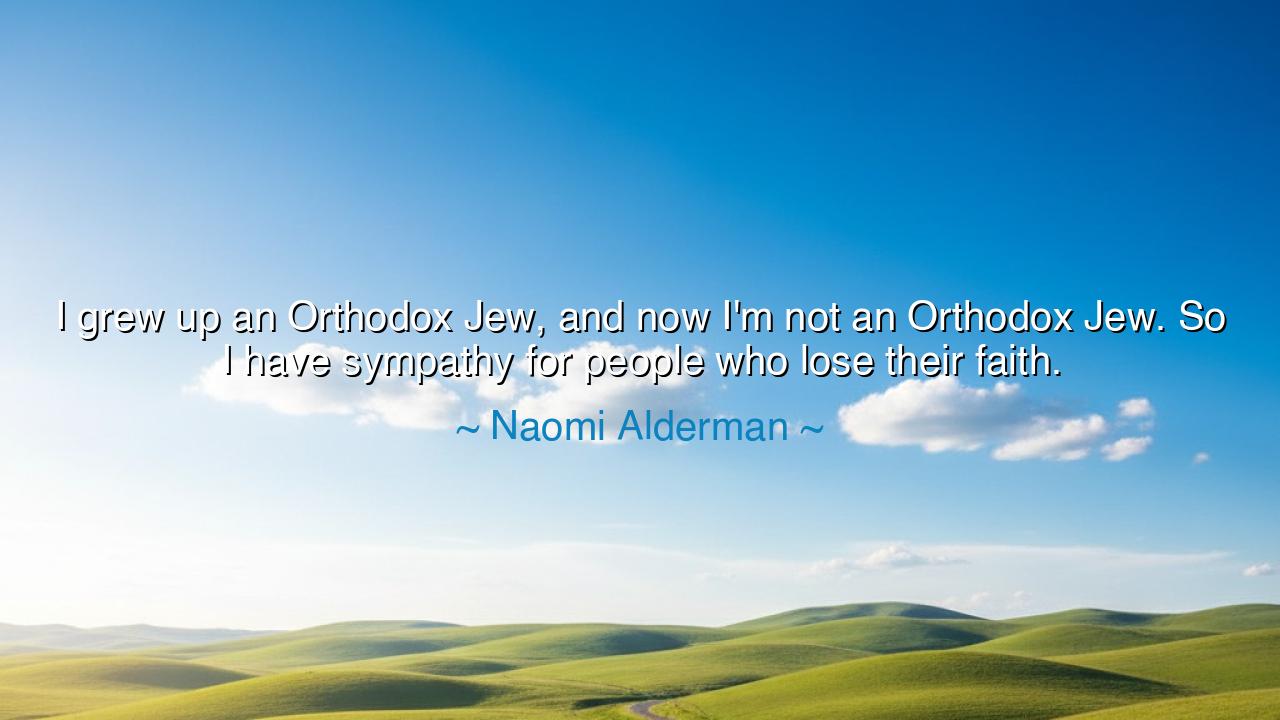
I grew up an Orthodox Jew, and now I'm not an Orthodox Jew. So I
I grew up an Orthodox Jew, and now I'm not an Orthodox Jew. So I have sympathy for people who lose their faith.






Children, gather close, for I bring you the wisdom found in the words of Naomi Alderman: "I grew up an Orthodox Jew, and now I'm not an Orthodox Jew. So I have sympathy for people who lose their faith." These words speak to the deepest aspects of the human condition—the journey of belief and the struggle that comes with losing something that once shaped your very identity. Faith, children, is not just a set of beliefs, but a lens through which we view the world and understand our place in it. To lose one's faith is not simply to abandon a set of doctrines; it is to face the existential void, the sense of loss that comes with questioning what once seemed certain.
Consider the ancient Greeks, who believed that faith in the gods was the very foundation of their society. To lose faith in the gods was not just a personal matter—it was seen as a threat to the very fabric of the state. Yet, the greatest minds of Greece—Socrates, Plato, and Aristotle—wrestled with the idea of faith, and many of them questioned the nature of the gods and the role of belief in shaping human morality. Socrates famously said, "The unexamined life is not worth living," suggesting that to truly understand the world, one must be willing to challenge and question the beliefs that have been handed down. The struggle with faith is not a new one; it is a battle as old as humanity itself—a battle between certainty and doubt, between comfort and disillusionment.
To lose one’s faith, children, is often seen as a journey through darkness, a fall into the unknown. But the loss of faith is not always a defeat. Rather, it can be an opportunity for growth—a chance to redefine what it means to be human in a world without the comforting embrace of certainty. Think, for example, of the ancient prophets, such as Job, who faced the greatest of sufferings, questioning the very existence of the divine in the face of his suffering. Job’s journey was not one of abandoning faith but of confronting the tensions between suffering and belief, between the human experience and the notion of a benevolent god. His struggle with his faith became the foundation of his true spiritual awakening. Similarly, Naomi Alderman, in her reflection on losing Orthodox faith, may be speaking to this very journey of confronting loss and finding new meaning.
Sympathy, as Alderman describes it, is the emotional understanding that comes from shared experience. To lose faith is to experience a deep and personal grief, for faith is not simply a belief system but a core part of one’s identity. The community built around faith can feel like a family, and when one leaves or loses that family, the sense of belonging often evaporates. To truly sympathize with someone who loses their faith is to recognize that grief and confusion are natural responses to such a loss. It is to acknowledge the journey they have undertaken—one that may be fraught with doubt, fear, and sometimes, isolation.
Consider the example of Martin Luther, the great reformer, who once lost faith in the institution of the Catholic Church that had shaped his early life. Luther's journey was one of transformation, where his dissatisfaction with the Church's practices led him to rediscover his faith in a radically different way. Through his struggle and his doubts, Luther found a path to a new kind of spiritual freedom. His loss of faith in one system became the birth of a new form of faith that transformed the course of history. In this, we see that the loss of faith, far from being the end of a journey, can become the beginning of something entirely new—something that can reshape not only the individual but the world itself.
So, children, the lesson of Naomi Alderman’s words is this: the loss of faith is not the loss of one’s self. It is a challenge, yes, a journey through the wilderness of doubt and confusion, but it is also a chance for growth. Just as the ancient philosophers and reformers struggled with their beliefs and emerged with greater clarity, so too can you find strength in the face of doubt. Sympathy for those who lose their faith is not about pity, but about understanding the complexity of the human spirit. It is recognizing that faith is not a static thing, but a living part of us that can evolve and change.
In your own lives, children, know that faith, whether in a religion, a philosophy, or even in people, will ebb and flow. Do not fear the moments of doubt, for they are the moments in which you grow the most. Let them be the moments in which you question, not with despair, but with the hope of finding a deeper truth. And if ever you encounter someone who has lost their faith, do not judge them for their journey, but offer them understanding and compassion, for you know, deep within, that we are all travelers on this path together, searching for meaning in a world full of questions.
Remember, children, that the loss of faith is not the end, but the beginning of a new chapter. Just as Job wrestled with his doubts and found wisdom, and just as Luther questioned the Church and reformed it, so too can you find strength in the loss of faith. Let it be an opportunity for deeper connection, understanding, and growth, as you forge your own path in the world.






AAdministratorAdministrator
Welcome, honored guests. Please leave a comment, we will respond soon